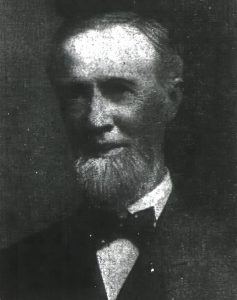(Sept. 24, 1836-Apr. 9, 1909). Frederick Davis was born in Jackson, Missouri. His parents, David Hamilton Davis and Matilda Whitelaw Davis, were among the early settlers to the area. After a limited education in Missouri, he moved to Indianapolis in 1852 at age 16 to look for work as a machinist. Instead, he became a clerk at a couple of downtown Indianapolis stores before landing a sales job at the G. G. and J. W. Holman dry goods store, at 11 West Washington Street.
Davis met and married Elizabeth “Bettie” Ketcham, daughter of Indianapolis attorney John Lewis Ketcham and Jane Merrill Ketcham, granddaughter of , Indiana’s first state treasurer, on October 11, 1864. The couple had two children.
His marriage into the Ketcham family changed his life trajectory. His new family connections made possible a job at the . Here and later at Fletcher & Sharpe Bank, he became involved in the city’s financial concerns.
Davis earned the respect and trust of many bankers and businessmen during his early years in banking. Indeed, he played an instrumental role in securing loans to pay the Indiana troops during the . Indiana governor found it virtually impossible to gain the financial support he needed due to numerous southern-cause sympathizers in Indiana financial circles. Davis aided the governor through his relationship with Madison, Indiana, banker F. D. Lanier. Davis secured the loans Morton needed from Lanier’s bank, Winslow, Lanier & Company of New York City.
Toward the end of the war, on March 14, 1865, Davis and six others formed a copartnership to organize the Indiana Banking Company. Davis became acting head of the bank and remained there until its forced liquidation on August 13, 1883.
At the Indiana Banking Company, Davis became connected to the (IWC). The water company’s first president was , whom Davis had known when he was quartermaster general of Indiana’s troops in the Civil War. Davis extended loans on the stock of the water company, which increased the value of the bank’s holdings since the vast majority of those loans were made good.
Because Davis became intimately involved with the finances of IWC, Morris offered him the positions of vice president and treasurer of the organization. Davis took the jobs while simultaneously maintaining his position as acting head of the Indiana Banking Company. Davis went on to assume presidency of the water company upon the death of Morris in 1904.
The Indianapolis Water Company thrived under Davis’s leadership. He reorganized its finances and elevated the water quality standards for the city of Indianapolis beyond that found in other cities in the United States at that time. Innovations and upgrades to the city’s water system ensured the city’s abundant supply of pure water, which its citizens acquired at reasonable rates relative to comparable cities across America.
Davis was active in the American Water Works Association, an organization for which he served as president in 1898. He took an interest in the technical and practical work of this organization, which he demonstrated through the numerous papers he presented at organizational meetings. Notably, he spoke about progressive work in effective water systems, demonstrating his grasp of scientific and practical details related to the advancement of overall water distribution pathways.
Davis continued giving talks about progressive water systems in his work with the Indiana Commissioner to the Internal Waterways Commission from 1907 until his death.

Help improve this entry
Contribute information, offer corrections, suggest images.
You can also recommend new entries related to this topic.





